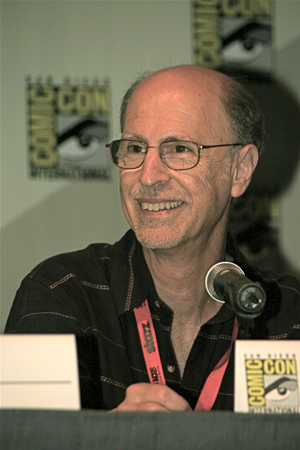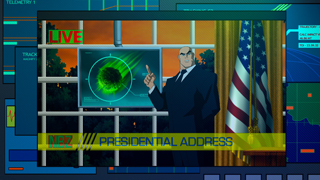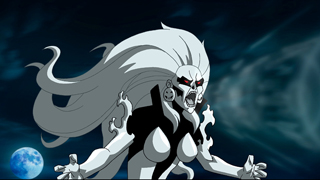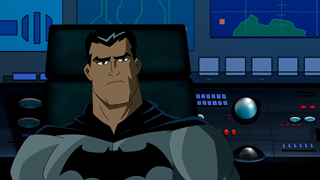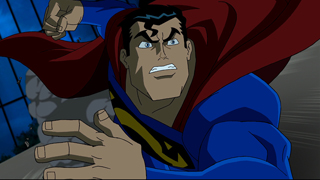|
Stan
Berkowitz, Not A Public Enemy
Screenwriter Moves From The New Frontier
To Superman/Batman...
| |
| My
own perspective: talented, humble and an utmost
professional. |
Screenwriter Stan Berkowitz guides another classic DC
Comics graphic novel to animated glory with the September
29 Warner Home Video release of Superman/Batman: Public Enemies.
Berkowitz
brought Darwyn Cooke’s landmark Justice League: The
New Frontier from pages to screen in 2008, and this
year he’s converted the words of Jeph Loeb into a
summer popcorn-style blockbuster with the crafting of the
script for Superman/Batman: Public Enemies.
In
Superman/Batman: Public Enemies, United States President
Lex Luthor uses the oncoming trajectory of a Kryptonite
asteroid to frame Superman and declare a $1 billion bounty
on the heads of the Man of Steel and his “partner
in crime,” Batman. Heroes and villains alike launch
a relentless pursuit of Superman and Batman, who must unite
– and recruit help – to stave off the action-packed
onslaught, stop the asteroid, and uncover Luthor’s
devious plot to take command of far more than North America.
Berkowitz
has been actively writing for 30 years, focusing his efforts
on animated properties for the past dozen years. His animated
credits range from Superman: The Animated Series and Batman:
The Animated Series to Justice League, The Batman and Legion
of Super Heroes, with stops on shows like Static Shock,
Batman Beyond and Spider-Man along the way. Prior to moving
into the animated realm, Berkowitz garnered credits writing
episodes of T.J. Hooker and the latter-day versions of Dragnet
and Adam 12.
Berkowitz
pushed the keyboard aside to discuss the differences between
his film and Loeb’s initial take on the tale, the
importance of great voice actors and a fine director, reaching
into the DC vault for his childhood memories, the little
things Alan Burnett does to make a big impact, and the ideal
writing environment. Read on … Stan Berkowitz is speaking.
GARY
MIEREANU: Why was this story right for you?
STAN
BERKOWITZ: I love the political aspect of it. In
the comic book that Jeph Loeb wrote, it was assumed that
everyone knew the backstory to how Luthor got elected President.
But we needed the movie to show an audience, who might not
be familiar with the comics, exactly what would have to
happen for Luthor to be elected.
I sort
of envisioned Luthor ascending to the Presidency somewhere
around 2012. I didn't quite predict the catastrophe we'd
be seeing in 2008. But I figured that something bad would
happen, and then Democrats would be elected in 2008, they
wouldn’t be able to solve the problem and, in 2012,
a tough, Ross Perot-style third party bid would be the one
who'd be elected.
| |
| President
Luthor. Was Ross Perot nuttier? |
It was
kind of fun for me to envision the political atmosphere
that would have to take place in order for that to happen.
And I also had a wonderful time going with Jeph's depiction
of Luthor's descent into insanity – always keeping
in mind that Clancy Brown would be enacting the dialogue.
It was just great to write that.
GARY
MIEREANU: Superman/Batman: Pubic Enemies follows
Justice League: The New Frontier as your second DC Universe
film adaptation of a classic DC Comics graphic novel/com
series. Are there specific challenges to adapting a well-known
story?
STAN
BERKOWITZ: Each adaptation is different, and presents
different challenges. In New Frontier, the challenge
was compressing all the material into a coherent 75-minute
story. In Public Enemies, the challenge was making the thematic
concerns concrete because the comic author had the luxury
of a narrator to talk about the themes. And when we did
the screenplay, we had to show the themes in action, having
things happen to illustrate those themes.
For
Public Enemies, there was also the issue of credibility.
We were concerned that if a person who vaguely knows Superman
and Batman grabs this off the shelf and sees Lex Luthor
as President, he might think, “hey, what's going on
here?” It might just put them off, or make them think
this was an alternate world story. And that’s not
how it’s advertised.
The
other credibility issue is that in the comic, Luthor believes
that the meteor is coming to Earth because of Superman.
As a reader, I could not get past the fact that the public
buys Luthor's explanation. I didn't believe an audience
watching this as an animated production would buy Luthor's
explanation. So Alan (Burnett) and Bruce (Timm) and I had
to figure out an alternate way for Luthor to frame Superman.
I think it worked very well.
GARY
MIEREANU: What makes Lex Luthor such a great
villain?
STAN
BERKOWITZ: I think anytime you do a story, you
have to ask yourself, “What does the villain want?”
And the more complex the villain, the more unusual a thing
it is that he wants – and, thus, the better the story
will be.
In Luthor's
case, he's like Salieri to Superman's Mozart. Salieri would
have been the era's greatest composer had it not been for
Mozart, and Salieri knows this. In the same vein, Luthor
would have been the leading light of our generation except
for Superman, and there's nothing that he can do about it.
He's cast into the shadows, and that's why he has that pathological
hatred of Superman.
GARY
MIEREANU: You've written Batman, and you've written
Superman. Now you’ve gotten to write them together?
What’s that dynamic like to combine them and use that
chemistry to bring out the personalities?
| |
| Screaming
like a Banshee. |
STAN
BERKOWITZ: Well, Batman and Superman are opposites.
Superman has always been presented as the character from
the light, the daytime; Batman from the nighttime. They
have decidedly different outlooks. Superman is the ultimate
kid from Kansas, who had a real healthy upbringing. Batman
is the tormented orphan. In a way, Superman's outlook is
too sunny, and Batman’s is too dark. The two of them
work against each other, trying to temper each other's attitude.
Superman
wants to cheer up Batman to a certain extent, and Batman
wants to make Superman aware that there is a darker world
under what Superman normally sees. It’s fun to create
banter between them. It was also fun to adapt the banter
that was in the graphic novel, and we used a lot of it.
Jeph’s words were so good, we just pulled dialogue
directly from the pages of the novel.
GARY
MIEREANU: Are you thinking of the cast’s
voices when you're writing and, if so, does that help you
write?
STAN
BERKOWITZ: I’m definitely thinking of the
actors' voices. Not to denigrate Superman and Batman, but
this is Luthor's story. Luthor has more dialogue than either
Batman or Superman. And frankly, I actually gave him even
more dialogue in those long speeches because I was hoping
Clancy Brown would get the part, which he did.
It’s
so pleasurable to watch – and hear – Clancy
do those Luthor lines, to watch Clancy's descent into madness.
It just brought me back to the days when I got into this
medium in the first place. Suddenly, I was just a 13-year-old
with a movie camera having fun with my friends and doing
these little movies. It had that same visceral pleasure
for me. Tim (Daly) and Kevin (Conroy) are sensational, too
– those were also the voices I had in mind while I
was writing. But this really is Clancy's vehicle this time.
GARY
MIEREANU: Do you remember your first experience
with Superman and with Batman?
STAN
BERKOWITZ: Easily. The reason I remember this so
well is that when I started working on the show Superboy
in Florida, I was flown to New York to meet Mike Carlin
and Andy Helfer at DC Comics. And we talked for most of
the day about the Superboy show and then they just casually
mentioned, “Oh, by the way, we happen to have a library
here of all the comics that DC has ever done.”
Well,
I got to go see it. I went into that library and found the
very first two comics I'd ever gotten. One of them was an
issue of Batman -- Detective Comics -- with a character
called Garth, and it involved a crossbow being used to kill
someone in an empty room. The strings had been held back
by a cake of ice. And when the ice melted, the crossbow
let go and killed the guy sitting in this deserted room.
And
the other one was a Superboy, Adventure Comics from
August of '58, where Superboy played all the positions on
a baseball team, thanks to his super speed. And I remember
I'd been sick in the evening, and my father went out and
got the medicine for me, and also picked up those two comic
books. So it was kind of cool, almost like reaching into
a time capsule, because I hadn't seen the comics in over
30 years.
GARY MIEREANU: What is your strength
in this industry?
STAN
BERKOWITZ: I think part of my strength is work
habits. One of the lessons I learned from my very first
job after film school was from (film director/writer)
Russ Meyer. He said that from the time you wake up 'til
the time you go to sleep, when you’re on a show, the
show owns you. You don't own the show. There's no going
home at 6:00 at night. I have no idea if there's any creativity
involved (he laughs), but I'm fairly certain that the conscientiousness
might explain some of the longevity.
GARY
MIEREANU: Which presents more challenges: writing
an original Stan Berkowitz story or adapting someone else's
work?
STAN
BERKOWITZ: Doing an original presents more challenges.
The adaptations are already there – the studio knows
they want to do it. In both the case of New Frontier
and Public Enemies, I was approached by the studio
and asked if I wanted to adapt them. Getting your own thing
off the ground is much, much more difficult because even
in our little world of animation, the, pre-selling is an
important factor. And in both the case of New Frontier
and Public Enemies, you had best-selling comics
that the fans already knew.
GARY
MIEREANU: What's the perfect environment for you
to write in?
STAN
BERKOWITZ: I like an empty room, and that's all
I really need because there are absolutely no distractions.
No TV, no internet, just a quiet room. It works for me.
And it helps me to work faster. From the day they decided
to do Public Enemies until the day that the first
draft of the script was ready, it was exactly 60 days –
which is really, really fast for a feature-length project.
When
I started writing in film school, I'd have the TV on. Now
I can't even have music on. It just has to be dead quiet
with nobody around, nobody coming to bother me. It’s
all about concentration. I can go for about two hours before
I need a distraction, then I come back and go for another
two hours. If you plan your whole day carefully, you can
get in eight hours of work and probably six to seven pages
of finished screenplay a day. There are other writers who
can do 10 or 12, but they're probably burned out after about
a week or two.
GARY
MIEREANU: Beyond the narrative, are there any other
key differences between Jeph Loeb's version and what we'll
see in the movie?
STAN
BERKOWITZ: I think the largest one involves what
Superman is framed for. We just didn’t find it credible
that the American public would believe that Superman was
somehow drawing the meteor to Earth. We thought we needed
something that made a little bit more sense.
My first
instinct was to have Superman accused of an attempted murder
on Metallo, and then have this whole thing where ultimately
Metallo plays a key role by donating his skeleton to be
the nose cone of the rocket. That didn’t work, and
then Alan (Burnett) suggested having Metallo murdered and
framing Superman for that.
Then
Alan asked the next question and answered it himself. “Why
would anybody believe that Superman had killed Metallo?”
And the answer that Alan gave for why people would believe
that Superman would kill was that Superman's mind was already
being affected by the kryptonite radiation coming from the
approaching meteor. Suddenly, the public is afraid that
a crazed Superman could just go off the handle and kill
anyone. I felt that that was a very effective way of framing
Superman.
GARY
MIEREANU: What’s the influence of Alan
Burnett on the DC Universe films?
STAN
BERKOWITZ: Alan Burnett has become an uber editor
of all of the DCU DVDs, and hopefully that remains his role
from now on. I started working for Alan in 1996 and, in
my opinion, you could not ask for a better guy in that position.
He’s almost always one of the few adults in the room.
Inevitably,
he'll come up with something that seems really small, but
then changes the whole story and makes it work. The radiation
effecting Superman’s mind is a perfect example. I
never would have thought of that. But then here’s
Alan sitting quietly and then saying something that fixes
everything. That's what Alan does. His criticisms are always
constructive. And you never, never see much ego involved
– at least I haven’t in the past 12 years.
GARY
MIEREANU: What it's like for you to hear
your words take life in a recording session?
STAN
BERKOWITZ: It’s fun, but it makes you appreciate
just how good everyone else involved really is. For starters,
Andrea (Romano) makes it look very, very simple,
but I urge anyone who thinks it's simple to actually try
to direct actors. It’s hard. Very hard. They speak
a different language.
We were
working on an episode of Justice League, and I
happened to get to the recording session early and the only
other person there already was the lead villain. We started
chatting and, of course, the conversation turned to “How
did you see this guy?” So I tell him my concept of
the character.
I swear
to God, it took Andrea an hour of recording time to undo
the damage I'd done because I spoke to him from the wrong
perspective. An actor wants to know the internal emotional
aspect of how the character feels, and I was describing
the character from the outside, as how you would see him.
I’ve
been blessed in that Andrea is one of the few dialogue directors
I’ve worked with since 1996. When you hear an actor
– who’s either bad or who’s badly directed
– doing your dialogue, you start thinking, “Oh
my God, I'm a terrible writer.” And then you hear
your words being directed by good director, working with
good actors, and you say, “Hey, I'm good. I can write
dialogue.” That's the pleasure of being in a recording
session for one of your scripts.
Warner
Premiere, DC Comics and Warner Bros. Animation will present
the all-new Superman/Batman: Public Enemies in a Blu-Ray™
Hi-Def edition, a special edition 2-disc DVD, and a single
disc DVD. Warner Home Video will distribute the action-packed
movie, which will also be available OnDemand and Pay-Per-View
as well as available for download on Sept. 29.
For
more information, images and updates, please visit the film’s
official website at www.SupermanBatmanDVD.com.
|
